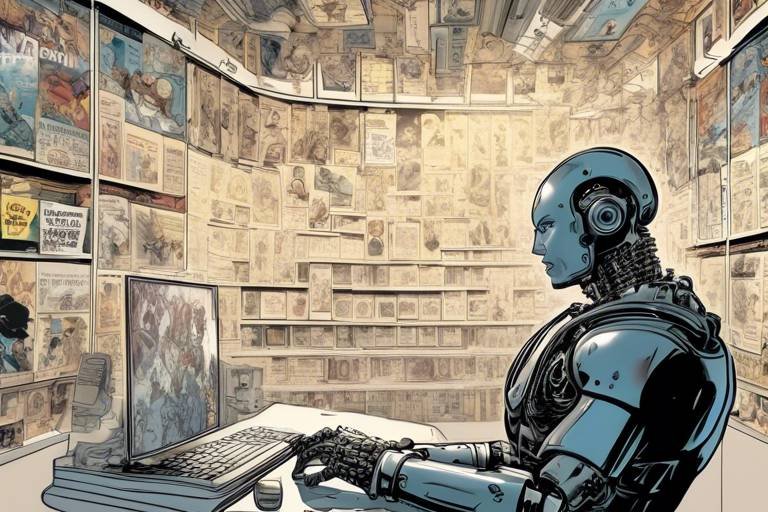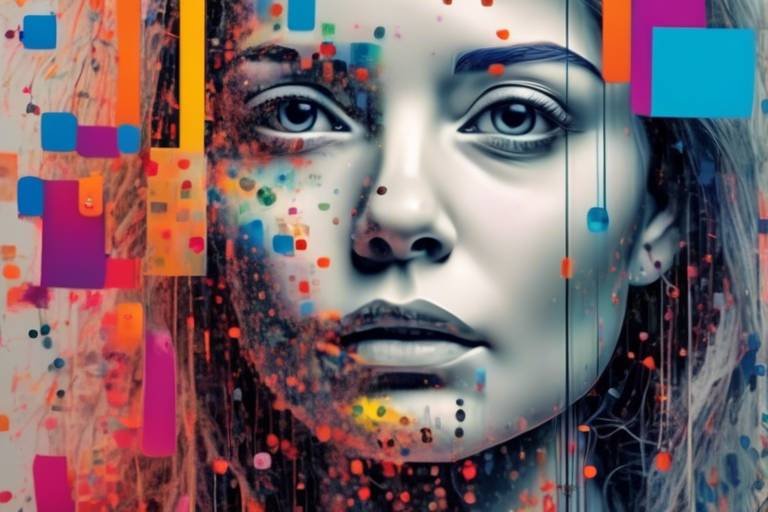AI's Impact on Plot Development in Narrative Writing
In recent years, the emergence of artificial intelligence has sparked a revolution in various fields, and narrative writing is no exception. The way stories are crafted is evolving, thanks to AI's ability to analyze patterns, suggest ideas, and even generate entire plots. Imagine a world where writers can break through creative barriers with the help of a digital assistant that understands storytelling nuances. This article delves into how AI is transforming plot development in narrative writing, examining its benefits, challenges, and the future of storytelling in a technology-driven world.
To truly grasp the impact of AI on narrative writing, we must first reflect on the historical context of storytelling. From ancient oral traditions to the printed word, narrative techniques have continuously adapted to cultural shifts and technological advancements. In the past, writers relied heavily on their imagination and personal experiences to weave tales. However, as we move into a digital age, AI is becoming a significant player in shaping contemporary storytelling techniques and plot structures. This evolution is not merely a trend; it's a paradigm shift that opens doors to innovative approaches in literature.
Today, a plethora of AI tools are available for writers, offering assistance in various stages of the writing process. These tools can help with brainstorming, plot generation, and character development, ultimately enhancing both creativity and efficiency. For instance, writers can use AI-driven software to generate unique story ideas, overcoming those pesky creative blocks that often hinder progress. It's like having a brainstorming partner who never runs out of ideas!
When faced with a blank page, many writers experience a sense of dread—what if the ideas just don’t flow? This is where AI can shine. By analyzing existing narratives and drawing from vast databases, AI can suggest fresh, unique story ideas that might not have crossed a writer's mind. This capability encourages writers to explore new narrative directions and themes, allowing for a more diverse range of stories. Imagine being able to tap into a well of endless inspiration at the click of a button!
Another fascinating aspect of AI in narrative writing is the potential for collaborative writing. Writers can engage with AI systems to co-create stories, blending human creativity with machine-generated suggestions. This partnership can lead to compelling narratives that reflect a unique fusion of ideas. For example, a writer might draft a scene and then use AI to suggest alternative plot twists or character motivations, resulting in a richer and more engaging storyline.
Character development is a crucial element of storytelling, and AI can play a significant role in this area as well. By analyzing character arcs and traits from successful narratives, AI can suggest traits, backstories, and arcs that align with the overall plot. This not only enriches the narrative depth but also helps writers create more relatable and multidimensional characters. Think of AI as a personal assistant that helps you build your characters from the ground up, ensuring they resonate with readers.
Plot structuring is another area where AI algorithms can make a substantial impact. By analyzing successful plot structures across genres, AI can offer insights and recommendations for writers. This guidance can help in crafting engaging and coherent storylines, ensuring that the narrative flows smoothly and captivates the audience. Just like a skilled architect designing a building, AI can help writers construct a solid framework for their stories.
Despite its numerous benefits, the integration of AI into writing is not without its challenges. Writers face ethical dilemmas regarding originality and plagiarism, as well as concerns about the potential loss of the unique human voice in storytelling. These challenges must be navigated carefully to ensure that the authenticity of the narrative remains intact.
As writers embrace AI tools, they must address ethical considerations surrounding the use of AI in creative processes. Questions about originality and authorship arise—is a story generated with AI still the writer's own? It's crucial for writers to maintain their individual style and voice, even while leveraging technology to enhance their craft.
Finding the right balance between utilizing AI tools and maintaining personal creativity is vital. Writers should view AI as a complementary tool, not a replacement for their imagination. By striking this balance, narratives can retain a human touch, ensuring that stories are not only well-structured but also emotionally resonant.
As AI technology continues to evolve, its role in narrative writing is set to expand even further. We can anticipate the emergence of new genres and storytelling formats that challenge traditional narrative conventions. The future of storytelling is bright, and with AI as a partner, writers have the potential to explore uncharted territories in narrative creativity.
- How can AI help overcome writer's block? AI can generate unique story ideas and plot suggestions, providing fresh perspectives that can inspire writers.
- Are there ethical concerns with using AI in writing? Yes, writers must consider issues of originality, authorship, and the potential loss of their unique voice when using AI tools.
- Can AI replace human creativity? No, AI should be seen as a tool to enhance creativity, not a replacement for the human imagination.

The Evolution of Narrative Writing
Narrative writing has undergone a remarkable transformation throughout history, evolving from ancient oral traditions to the complex storytelling forms we see today. In ancient times, stories were shared verbally, often passed down through generations, allowing communities to bond over shared tales and cultural myths. These early narratives were simple, focusing on fundamental human experiences such as love, conflict, and survival. As societies progressed, so did the art of storytelling. The invention of writing systems marked a pivotal moment, enabling narratives to be recorded and disseminated beyond the constraints of memory.
During the Middle Ages, storytelling took on new dimensions with the rise of literature. Writers like Geoffrey Chaucer and Dante Alighieri began to experiment with narrative techniques, incorporating elements such as character development, dialogue, and complex plots. This era laid the groundwork for the rich tapestry of storytelling that would flourish in the Renaissance and beyond. The advent of the printing press in the 15th century revolutionized access to literature, allowing stories to reach a wider audience and inspiring a new wave of writers to explore diverse genres and styles.
Fast forward to the 19th century, and we see the emergence of the novel as a dominant form of narrative writing. Authors like Jane Austen and Charles Dickens crafted intricate plots and memorable characters, reflecting the complexities of human nature and society. This period also saw the rise of literary movements, such as realism and romanticism, each bringing its unique flavor to storytelling. As the 20th century dawned, writers began to challenge traditional narrative structures, experimenting with stream-of-consciousness techniques and nonlinear storytelling, as seen in works by Virginia Woolf and James Joyce.
Today, we find ourselves in a digital age where technology plays a crucial role in shaping narrative writing. The rise of the internet and digital media has given birth to new storytelling formats, such as blogs, interactive fiction, and social media narratives. These platforms allow for greater interactivity and audience engagement, blurring the lines between author and reader. Furthermore, the integration of artificial intelligence into the writing process is pushing the boundaries of what storytelling can achieve. AI tools can analyze vast amounts of data, providing writers with insights into successful plot structures and character arcs, ultimately enhancing the creative process.
As we look to the future, the evolution of narrative writing seems poised to continue its trajectory of innovation. With AI's influence growing, we can expect to see even more diverse storytelling techniques emerge, challenging our traditional notions of narrative and expanding the horizons of creativity. The interplay between human imagination and machine intelligence could lead to groundbreaking genres that we can't yet fathom, making this an exciting time for writers and readers alike.

AI Tools for Writers
In today's fast-paced world, writers are constantly seeking ways to enhance their creativity and streamline their writing process. Enter AI tools, a game changer that is transforming the landscape of narrative writing. These tools provide a plethora of functionalities that can assist writers at various stages of their projects, from the initial brainstorming phase to the final editing touches. Imagine having a brainstorming partner who never tires, or a character development assistant that knows the intricacies of storytelling like the back of its digital hand. Sounds intriguing, right?
One of the most significant advantages of AI tools is their ability to generate unique story ideas. When writers hit a creative block, AI can step in and suggest fresh angles or plot twists that might not have crossed their minds. For instance, an AI program could analyze existing narratives and propose a storyline that combines elements from different genres, creating something entirely new and exciting. This capability to think outside the box can be invaluable, especially for writers looking to break free from conventional storytelling molds.
Moreover, AI isn't just about generating ideas; it also excels in collaborative writing. Writers can engage with AI systems to co-create stories, where the human touch meets machine-generated suggestions. This collaborative approach allows for a dynamic interplay of creativity, leading to narratives that are not only engaging but also innovative. Imagine crafting a plot where your AI partner suggests a character arc while you infuse it with emotional depth based on your own experiences. This synergy can elevate the storytelling experience to new heights.
Another area where AI shines is in character development. Writers often struggle with creating multi-dimensional characters that resonate with readers. AI tools can analyze character traits, backstories, and arcs that align with the overall plot, helping to enrich the narrative's depth. For example, an AI might suggest that a character who has experienced loss could have a unique perspective on relationships, prompting the writer to explore this theme further. By leveraging AI, writers can create characters that feel real and relatable, enhancing the overall impact of their stories.
When it comes to plot structuring, AI algorithms can analyze successful plot structures and offer insights on how to craft engaging and coherent storylines. These tools can identify common patterns in popular narratives, allowing writers to understand what captivates audiences. By providing recommendations based on data, AI can help writers make informed decisions about pacing, conflict, and resolution, ensuring that their stories keep readers on the edge of their seats.
In summary, AI tools for writers are not just a passing trend; they are becoming essential companions in the creative process. By enhancing brainstorming, facilitating collaborative writing, enriching character development, and providing valuable insights into plot structuring, these tools empower writers to push the boundaries of their storytelling. As we embrace this technology, the possibilities for narrative innovation are truly limitless.

Brainstorming Ideas with AI
Imagine sitting at your desk, staring at a blank page, and feeling the weight of writer's block pressing down on you like a heavy fog. We've all been there, right? The good news is that artificial intelligence (AI) is here to help lift that fog and spark your creativity. By harnessing the power of AI, writers can generate unique story ideas that might just be the key to unlocking their next great narrative.
So, how exactly does AI assist in brainstorming? Well, AI tools are designed to analyze vast amounts of data, drawing on a multitude of sources, genres, and themes. This capability allows them to suggest ideas that you may not have considered, pushing the boundaries of your imagination. For instance, an AI writing assistant can provide prompts based on trending topics, popular archetypes, or even random word combinations, which can serve as a springboard for your creativity.
One fascinating aspect of using AI for brainstorming is the ability to explore new narrative directions. By inputting a few keywords or themes, writers can receive a plethora of suggestions that can lead to unexpected plot twists or character developments. This process not only helps to overcome creative blocks but also encourages writers to think outside the box.
Here’s a quick look at some of the ways AI can enhance brainstorming sessions:
- Idea Generation: AI can churn out countless story ideas in seconds, giving you a treasure trove of concepts to work with.
- Genre Exploration: If you're unsure about which genre to tackle next, AI can suggest ideas across various genres, helping you discover new styles.
- Character Inspiration: AI can generate character profiles, including traits, backgrounds, and motivations, to help you build rich, multidimensional characters.
The collaboration between human creativity and AI technology is akin to a dance. While the AI provides the rhythm with its suggestions, it’s up to the writer to interpret and add their unique flair. This synergy can lead to innovative storytelling that captures readers’ attention in ways that traditional methods might not.
However, it's essential to remember that while AI can be a fantastic tool for brainstorming, it should not replace your creativity. Think of it as a partner that helps you refine your ideas rather than dictating them. The heart of storytelling lies in human experience, emotion, and imagination—elements that AI cannot replicate.
As we continue to explore the relationship between AI and narrative writing, one thing is clear: the future of brainstorming is bright. With AI by our side, writers can expect to break through creative barriers and embark on exciting new storytelling journeys. The possibilities are endless, and who knows? Your next bestseller might just be a few AI-generated prompts away!

Collaborative Writing with AI
In the ever-evolving landscape of storytelling, is emerging as a game-changer for authors. Imagine sitting at your desk, coffee in hand, and having a virtual writing partner that never tires, never judges, and is always ready with a fresh idea. This is the reality that AI brings to the table. By blending human creativity with machine intelligence, writers can explore uncharted territories in narrative development.
So, how does this collaboration actually work? Picture this: you're stuck on a plot twist, and your mind feels like a blank canvas. Instead of staring at the wall, you turn to an AI tool. With just a few prompts, the AI can generate a multitude of suggestions that spark your imagination. It’s like having a brainstorming buddy who can instantly provide insights, themes, and even dialogue options that you might never have thought of on your own. This synergy not only enhances creativity but also speeds up the writing process, making it more efficient.
Moreover, AI can adapt to your unique writing style. By analyzing your previous works, it learns your preferences and can offer suggestions that align with your voice. This means that while you're collaborating with a machine, your personal touch remains intact. It’s essential for writers to remember that AI is a tool meant to augment their creativity, not replace it. The beauty of storytelling lies in the human experience, and AI can help highlight that by providing new angles and perspectives.
As writers engage in this collaborative dance with AI, they often find themselves experimenting with different genres and formats. For instance, an author might start with a traditional narrative but, with AI's help, pivot to a more experimental structure. The AI can suggest plot points that challenge the norm, pushing writers to think outside the box. This can lead to the creation of innovative stories that capture readers' attention in ways that traditional methods may not.
However, it is crucial for writers to maintain a balance. While AI can be an incredible asset, over-reliance on technology can dilute the authenticity of a writer’s voice. The key is to use AI as a supportive partner in the creative process. By doing so, writers can ensure that their narratives retain the emotional depth and resonance that only a human can provide.
In conclusion, collaborative writing with AI opens up a world of possibilities for narrative development. It empowers writers to push their creative boundaries, explore new ideas, and ultimately craft stories that resonate with readers in profound ways. As technology continues to advance, the partnership between human and machine will likely become an integral part of the storytelling journey.
- What is collaborative writing with AI? Collaborative writing with AI involves using artificial intelligence tools to assist in the writing process, providing suggestions, ideas, and insights that enhance the narrative.
- How can AI improve my writing? AI can help overcome creative blocks, generate new ideas, and suggest plot structures, making the writing process more efficient and innovative.
- Will using AI take away my unique voice as a writer? No, AI is designed to complement your writing style. It can learn your preferences and provide suggestions that align with your voice, enhancing rather than replacing your creativity.
- Are there ethical concerns with using AI in writing? Yes, writers must navigate issues of originality and plagiarism, ensuring that their work remains authentic and reflective of their personal creativity.

Enhancing Character Development
In the realm of narrative writing, character development is often the heartbeat of a story. Readers become emotionally invested in characters, and their journeys can make or break a narrative. With the advent of artificial intelligence, writers now have a powerful ally in crafting richer, more relatable characters. Imagine having a brainstorming partner that not only understands the nuances of human emotion but can also suggest intricate backstories and character arcs that resonate with audiences. This is where AI shines.
AI tools can analyze vast amounts of data from existing literature, identifying common traits and successful character developments that have captured readers' hearts over the years. By doing so, they can recommend traits that are not only compelling but also realistic, ensuring that characters feel authentic. For instance, if a writer is developing a protagonist who has faced adversity, AI can suggest characteristics that align with resilience, such as determination, empathy, or even a touch of humor to lighten the mood.
Moreover, AI can assist in creating dynamic character arcs. A character arc is essentially the transformation a character undergoes throughout the story. With AI's analytical capabilities, writers can visualize how different traits can lead to various outcomes, helping them to craft a more engaging narrative. This means that writers can explore multiple paths for their characters, experimenting with how different decisions might affect their growth. For example, a character faced with moral dilemmas could be developed in various directions, from a heroic figure to a tragic one, depending on the choices made throughout the plot.
Additionally, AI can help in maintaining consistency in character development. As writers weave intricate plots, it is easy to lose track of how a character should behave based on their established traits. AI can serve as a reminder, offering suggestions that keep the character's actions aligned with their personality and history. This ensures that readers remain immersed in the story without being jolted by inconsistencies that might pull them out of the narrative.
Furthermore, writers can utilize AI to generate character backstories that enrich the narrative tapestry. A well-crafted backstory can provide depth to a character, explaining their motivations and actions throughout the story. AI can analyze existing character archetypes and suggest unique backgrounds that might not have crossed a writer's mind. This can lead to the creation of multi-dimensional characters who feel real and relatable.
In conclusion, the integration of AI into character development represents a significant leap forward in narrative writing. By enhancing creativity, ensuring consistency, and providing unique insights into character arcs and backstories, AI empowers writers to create characters that resonate deeply with readers. As we embrace this technology, the possibilities for storytelling are endless, paving the way for narratives that are not only compelling but also profoundly human.
- How does AI help in character development? AI assists writers by suggesting traits, backstories, and arcs that align with the overall plot, enriching the narrative depth.
- Can AI replace the human touch in writing? While AI can enhance creativity, it cannot replace the unique human voice and emotional depth that writers bring to their narratives.
- What are the ethical considerations when using AI in writing? Writers must navigate issues of originality and authenticity to ensure their work remains true to their voice.

AI in Plot Structuring
When it comes to crafting a compelling narrative, the structure of the plot is absolutely crucial. Just like a well-built house needs a solid foundation, a story requires a meticulously crafted plot to stand tall and engage readers. Enter artificial intelligence, a game-changer in the world of narrative writing. AI algorithms can analyze countless successful plot structures from various genres, offering writers invaluable insights and recommendations to help them create engaging and coherent storylines.
Imagine having a personal assistant who has read every bestselling novel and can distill the essence of what makes a plot tick. That’s what AI brings to the table. By utilizing advanced data analysis, AI can identify patterns in successful stories, revealing common elements that resonate with audiences. These insights can guide writers in developing their plots, ensuring they hit the right emotional beats and maintain a gripping pace throughout their narratives.
Moreover, AI can aid in the creation of plot outlines, providing writers with a structured framework to build upon. This is especially beneficial for those who may struggle with organization or who find themselves overwhelmed by the intricacies of plot development. With AI-generated outlines, writers can focus on fleshing out their characters and setting while having a solid plot skeleton to follow. This dual approach not only enhances creativity but also boosts efficiency, allowing writers to produce more content in less time.
For instance, AI tools can suggest various plot twists or turning points based on the genre and target audience. Writers can input their story's premise, and the AI can generate multiple pathways, each with its own unique twists and turns. This not only sparks creativity but also encourages writers to explore directions they might not have considered on their own. The result? A rich, layered narrative that keeps readers on the edge of their seats.
However, it’s essential to remember that while AI can provide structure and suggestions, the final narrative still relies on the writer's unique voice and vision. The magic of storytelling lies in the nuances that only a human can provide. Thus, while AI can serve as a powerful ally in plot structuring, it should complement rather than replace the writer's creativity. By blending human intuition with machine-generated insights, writers can craft stories that are not only well-structured but also deeply resonant and meaningful.
In summary, the integration of AI in plot structuring is revolutionizing the way narratives are crafted. With its ability to analyze data and offer structured guidance, AI is helping writers navigate the complex landscape of storytelling, making the process more efficient and creative. As we embrace this technological evolution, the future of storytelling looks not only promising but also incredibly exciting.
- How does AI help in plot structuring?
AI analyzes successful plot structures and provides insights that can guide writers in creating engaging narratives. - Can AI replace human creativity in writing?
No, while AI can assist with structure and suggestions, the unique voice and creativity of a human writer are irreplaceable. - What are some popular AI tools for writers?
Some popular tools include Scrivener, Plottr, and various AI-driven brainstorming apps that help generate ideas and outlines.

Challenges of AI in Narrative Writing
While the integration of artificial intelligence into narrative writing offers exciting possibilities, it also presents a unique set of challenges that writers must navigate. One of the most pressing concerns is the ethical implications surrounding the use of AI. As writers increasingly rely on AI tools for inspiration and plot development, questions regarding originality and plagiarism arise. For instance, if an AI generates a plot twist that closely resembles a published work, who holds the copyright? These ethical dilemmas can create a murky landscape for writers, forcing them to consider how to maintain the authenticity of their work while utilizing machine-generated content.
Moreover, there's the risk of becoming overly reliant on technology. Imagine a painter who, instead of picking up a brush, opts to use a digital tool to create their masterpiece. While the digital tool can enhance the painting, it might also strip away the personal touch that makes the artwork unique. Similarly, writers who lean too heavily on AI tools may find themselves losing their distinct voice and style. It's crucial for authors to establish a balance between leveraging AI assistance and preserving their creative instincts.
Another challenge is the potential for AI-generated content to lack the emotional depth that human writers naturally infuse into their narratives. AI can analyze successful plot structures and suggest various directions, but it often struggles to replicate the nuances of human emotion and experience. As a result, stories produced with significant AI input may feel formulaic or devoid of the rich, complex emotions that resonate with readers. This raises an important question: Can AI truly understand the human experience, or will it always be a step removed?
To illustrate these challenges, consider the following table that summarizes the main issues writers face when integrating AI into their narrative processes:
| Challenge | Description |
|---|---|
| Ethical Considerations | Concerns about originality and potential plagiarism from AI-generated content. |
| Reliance on Technology | The risk of losing a unique voice and personal touch in storytelling. |
| Emotional Depth | AI may struggle to capture the complexities of human emotions in narratives. |
In conclusion, while AI offers remarkable tools that can enhance the narrative writing process, it comes with significant challenges that writers must address. Balancing the benefits of technology with the need for authenticity and emotional depth is crucial for maintaining the integrity of storytelling. As we forge ahead in this technology-driven world, it's essential for writers to critically assess how they incorporate AI into their creative processes, ensuring that their narratives remain rich, engaging, and uniquely human.
- Q: Can AI replace human writers?
A: While AI can assist in the writing process, it lacks the emotional depth and unique voice that human writers bring to their narratives. - Q: How can writers ensure their work remains original when using AI?
A: Writers should use AI as a tool for inspiration rather than a crutch, ensuring they add their own unique perspective and voice to the narrative. - Q: What are the ethical implications of using AI in writing?
A: Ethical concerns include originality, potential plagiarism, and the authenticity of the creative process when AI is involved.

Ethical Considerations
As we venture deeper into the realm of artificial intelligence (AI) and its influence on narrative writing, it becomes crucial to address the that accompany this technological evolution. Writers are often faced with dilemmas surrounding originality, plagiarism, and the very essence of creativity. When AI generates content, the line between human authorship and machine-generated text can blur, raising questions about what constitutes authenticity in storytelling.
One of the most pressing concerns is the issue of plagiarism. If an AI tool generates a plot twist that closely resembles an existing story, who is responsible? The writer who used the tool, or the developers of the AI? This scenario highlights the need for clear guidelines and ethical standards in the use of AI for creative purposes. Writers must ensure that they are not unintentionally borrowing from existing works without proper attribution, which can undermine their credibility and the integrity of their narratives.
Moreover, the reliance on AI tools can lead to a potential loss of the unique human voice in storytelling. While AI can assist in generating ideas and structuring plots, it lacks the emotional depth and personal experiences that characterize human writing. Writers should be cautious not to let AI overshadow their individual creativity. Instead, they should view AI as a collaborator that enhances their storytelling rather than a replacement for their unique perspective.
In navigating these ethical waters, writers can consider several key principles:
- Transparency: Be open about the use of AI tools in your writing process. Acknowledging the role of AI can enhance trust with your audience.
- Originality: Strive to infuse your personal experiences and insights into your narratives, ensuring that your voice remains distinctive.
- Accountability: Take responsibility for the content you produce, verifying that it does not infringe upon the works of others.
Ultimately, the ethical considerations surrounding AI in narrative writing require a delicate balance. Writers must embrace the advantages that AI offers while remaining vigilant about the potential pitfalls. By doing so, they can harness the power of AI to enrich their storytelling without sacrificing their creative integrity.
Q: Can AI replace human writers?
A: While AI can assist in generating ideas and structuring narratives, it cannot replicate the emotional depth and personal touch that human writers bring to their work.
Q: How can writers ensure their work remains original when using AI tools?
A: Writers should actively engage with AI-generated content, using it as a springboard for their own ideas while maintaining their unique voice and perspective.
Q: What are the ethical implications of using AI in storytelling?
A: Writers must navigate issues of plagiarism, authenticity, and the potential loss of human creativity, ensuring that their work remains original and ethically sound.

Balancing Technology and Creativity
In an era where technology is advancing at lightning speed, writers face the challenge of balancing the innovative capabilities of artificial intelligence with their own creative instincts. It's like walking a tightrope—on one side, you have the immense potential of AI tools that can streamline the writing process, and on the other, the irreplaceable essence of human creativity that gives stories their soul. So, how do we find that sweet spot?
First off, it's essential to recognize that while AI can provide a plethora of ideas and suggestions, it lacks the emotional depth and personal experiences that shape our narratives. Imagine AI as a skilled assistant who can help you draft a blueprint for your story, but it’s your unique perspective, your lived experiences, and your voice that will breathe life into that blueprint. This is where the magic happens!
To effectively balance technology and creativity, writers should consider the following strategies:
- Use AI as a Tool, Not a Crutch: Embrace AI for its strengths—like generating plot ideas or character traits—but remember to infuse your own style and emotions into the narrative. Think of it as a seasoning that enhances your dish rather than the main ingredient.
- Set Boundaries: Allocate specific tasks for AI and keep your creative processes separate. For instance, you might use AI for brainstorming but reserve the actual writing for yourself. This allows you to maintain control over your narrative voice.
- Iterative Feedback: Use AI-generated content as a starting point and refine it with your own insights. This iterative process can lead to a more polished and authentic piece of writing.
Moreover, it’s crucial for writers to engage in self-reflection. Ask yourself questions like: “What do I want to say?” and “How can AI help me express that?” This reflective practice can help you stay grounded in your creative vision while using technology to enhance it. Remember, the best stories often come from a place of authenticity, and no machine can replicate your unique voice.
As we embrace this new era of storytelling, the key lies in understanding that AI is not here to replace us but to elevate our craft. By finding a harmonious balance between technology and creativity, writers can unlock new dimensions of storytelling that resonate deeply with audiences. Think of AI as a collaborative partner that amplifies your creativity, allowing you to explore uncharted territories in your narratives.
- Can AI replace human writers? No, while AI can assist in various aspects of writing, it cannot replicate the emotional depth and unique voice that human writers bring to their stories.
- How can I ensure my writing remains authentic when using AI? Use AI as a tool to enhance your creativity, but always infuse your personal experiences and emotions into your narratives.
- What are some popular AI tools for writers? Some popular tools include OpenAI's ChatGPT, Sudowrite, and Jasper, which can assist in brainstorming, editing, and generating content.

The Future of AI in Storytelling
As we stand on the brink of a new era in storytelling, the role of artificial intelligence is set to expand dramatically. Imagine a world where your favorite stories are not just written by humans, but co-created with intelligent machines that understand narrative structures, character arcs, and emotional beats. This fusion of technology and creativity is not just a possibility; it’s becoming a reality. With AI’s ability to analyze vast amounts of data from existing literature, it can identify trends and patterns that might elude even the most seasoned writers. This means that the future of storytelling could be filled with innovative genres and formats that challenge our traditional notions of narrative.
One exciting prospect is the emergence of interactive storytelling, where AI can craft personalized narratives based on user input. Picture this: you’re reading a story, and at pivotal moments, you get to make choices that influence the plot’s direction. AI can dynamically adjust the storyline, creating a unique experience for each reader. This level of personalization could redefine how we engage with stories, making them more immersive and tailored to individual preferences.
Moreover, AI could pave the way for entirely new genres that blend various forms of media. Consider a narrative that combines elements of video games, films, and traditional literature, all driven by AI algorithms that adapt the story in real-time. This could lead to a more fluid storytelling experience where the boundaries between different media blur, creating a rich tapestry of narrative possibilities.
However, with these exciting advancements come challenges. Writers will need to navigate the ethical implications of AI involvement in storytelling. Questions around authorship and originality will arise, prompting discussions about what it means to be a creator in a world where machines play a significant role in the writing process. As we embrace AI, it’s crucial to ensure that human creativity remains at the forefront, preserving the unique voice that only a human can provide.
In conclusion, the future of AI in storytelling is a double-edged sword. It holds immense potential to revolutionize how we create and consume narratives while also presenting challenges that must be carefully addressed. As we look ahead, the collaboration between human writers and AI could lead to a golden age of storytelling, where imagination knows no bounds. So, are you ready to embrace this technological evolution in narrative writing?
- How will AI change the way stories are told? AI will allow for more interactive and personalized storytelling experiences, adapting narratives based on reader input.
- What are the ethical concerns surrounding AI in storytelling? Issues of authorship, originality, and the potential for AI to overshadow human creativity are significant concerns.
- Can AI create original stories? While AI can generate unique ideas and plot structures, the essence of human creativity is irreplaceable, and collaboration is key.
- What new genres might emerge from AI storytelling? We may see hybrids of traditional literature with interactive media, leading to innovative formats that challenge conventional storytelling.
Frequently Asked Questions
- How is AI changing narrative writing?
AI is revolutionizing narrative writing by offering tools that assist in brainstorming, plot generation, and character development. This technology helps writers overcome creative blocks and enhances their storytelling capabilities, leading to innovative narratives that might not have been possible before.
- What are some popular AI tools for writers?
There are several AI tools available for writers, such as ChatGPT, Sudowrite, and Scrivener. These tools can help with various aspects of writing, from generating ideas to structuring plots, making the writing process more efficient and creative.
- Can AI help with character development?
Absolutely! AI can suggest character traits, backstories, and arcs that align with the overall plot, enriching the depth of the narrative. This assistance allows writers to create more rounded and realistic characters that resonate with readers.
- What are the ethical concerns regarding AI in writing?
Ethical concerns include issues of originality and plagiarism, as well as the potential for AI to overshadow the unique human voice in storytelling. Writers must navigate these challenges to ensure their work remains authentic and true to their creative vision.
- How can writers balance AI assistance and personal creativity?
Finding the right balance involves using AI tools as a supplement rather than a replacement for personal creativity. Writers should leverage AI for inspiration and structure while ensuring their narratives maintain a human touch and emotional depth.
- What does the future hold for AI in storytelling?
The future of AI in storytelling is promising, potentially leading to new genres and formats that challenge traditional narrative conventions. As AI continues to evolve, it will open up exciting possibilities for writers and readers alike.



















